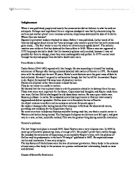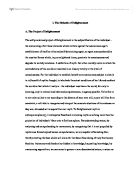`The elevation of reason then to be the sole source of human knowledge and motivation and the consequent belief in the accessibility of all knowledge through a rational and empirical approach were crucial features of Enlightenment thought. One product of this view was the Encyclopaedia edited by Diderot and d'Alembert but contributed to by many of the 'philosophes' including Voltaire, Condillac and Holbach. The Encyclopaedia consisted of technological information and 'enlightened' opinions on politics, philosophy, religion etc. The recording of the whole of human knowledge in this way is an illustration of the way in which the Enlightenment was concerned to substitute empirical knowledge for tradition.
`The Enlightenment's unswerving faith in the power of reason was not shared by Rousseau. Although Rousseau did believe that reason was a useful human capacity, he did not assign the same importance to it as the Enlightenment (DENT, 1992, p202). Whereas the Enlightenment's concern with the pre-eminence of reason had led it to deny that feelings played any role, Rousseau believed that compassion and sympathy were crucial human motivations. His concern to "accommodate both the heart and the head" (HAMPSON, 1968, p194) and his assertion that humans must take heed of their 'inner voice' (which is autonomous from any external authority) brought him into direct conflict with the beliefs of the Enlightenment. Indeed, in this respect, Rousseau can be seen as a forerunner to Romanticism. Furthermore, Rousseau's belief in God stemmed, not from any rational proof, but from his 'inner self', his contemplation of the beauty and order of nature: "All the subtleties of metaphysics will not make me doubt for a moment the immortality of the soul and a beneficient Providence. I feel it, I believe it, I desire it, I hope for it, I shall defend it to my last breath" (Rousseau, quoted by GRIMSLEY, 1973, p74).
`Rousseau believed that moral convictions and behaviour originated with feelings, not reason: "Even the precept of doing unto others as we would have them do unto us has no true foundation other than conscience or sentiment..." (quoted by DENT, 1992, p202). Thus, for Rousseau, man cannot use empirical observation and rationality to provide the solution to moral dilemmas, rather he must look to his inner convictions. Furthermore, morality is vital for Rousseau because he believed that without sound morality man cannot use his reason properly; a view opposed to the Enlightenment which followed Hobbes in its belief that rationality is man's sole capacity and motivation regardless of his moral condition.
`I shall now consider the attitudes of both with regard to progress. As already mentioned, the Enlightenment believed that man could find answers to all questions about the world through reason. This faith in the power of the scientific method caused thinkers to be optimistic. It was believed that through empirical investigation and analysis, man could gain access to all knowledge and therefore progress was inevitable.
`Rousseau did not share this optimistic outlook. In the First Discourse he voiced his pessimism with regard to the development on modern society and the arts and sciences and their effect on man. In the Discourse on the Origins of Inequality (1754) Rousseau plots the historical development of man from amorality in the state of nature to a society based on the family in which man has no choice other than to be moral to modern society in which pride and vanity ('l'amour-propre') are introduced and cause man to be immoral (HAMPSHER-MONK, 1992, pp163-170). As already discussed, for Rousseau sound morality is necessary for man to be able to properly utilise his capacity for reason and, consequently, the degeneracy of civilisation means that man cannot be rational. Naturally, this position brings him into serious conflict with Enlightenment thinkers. Furthermore, Rousseau believed that, once man had entered into modern society, the process of moral degeneration could not be reversed. One cannot return to the situation that exists in the primitive society of the family in which man must be moral because the possibility of presenting yourself as anything other than what you are to other members of society does not exist where relationships are so close. Given the impossibility of regressing to this 'golden age', Rousseau argues that the best solution is his ideal polity outlined in 'Du Contrat Social' in which all are equal and free and thus the institutions of society are conducive to morality.
`The political conclusions drawn by the Enlightenment and Rousseau were radically different. Firstly, it must be remembered that a single political position did not emerge from the Enlightenment. However, all thinkers believed that an elite should rule as the masses did not possess adequate reason, the low level of literacy being testament to this. Whilst no Enlightenment thinkers proposed a revolution (despite the influence of the movement upon the French revolution), the recommendations varied between a system based on the 1688 settlement in England (and Locke's work) or on Enlightened despotism (and Hobbes' work). Montesquieu, for example, in 'L'Esprit des Lois' (1748) followed Locke on the danger of absolutism and therefore proposed a system of limited government based on a separation of powers which he believed would safeguard against despotism (CASSIRER, 1951, pp19-21). However, many 'philosophes' favoured Enlightened despotism as the most effective and efficient way of achieving their ideal society. Voltaire, for example, had Frederick the Great as his patron for some time whilst Diderot enjoyed a similar arrangement with Catherine the Great (COBBAN, 1960, pp161-166). It was this school of Enlightenment thought which sought to bring about its objectives by enlisting the absolute power of a despot which Rousseau found abhorrent.
`Rousseau believed that man's natural freedom had been removed by the development of modern society and its political forms: "L'homme est ne libre, et partout il est dans les fers" (ROUSSEAU, 1762). Therefore, in 'Du Contrat Social' (1762), his principal aim was to outline a system of government which would restore man's independence and thus replacing the natural liberty which he had lost with civil and moral liberty. He argues that the people can never alienate their original sovereignty for to do so would be an act of madness and therefore the only legitimate form of government is that in which sovereignty is retained by the people. Consequently, the people are necessarily free because they are subject only to laws which have been made by the citizen body of which they are part. According to Rousseau, decisions by the people must be made in accordance with the general will because only this will ensure the realisation of the common good: "la volonte generale est toujours droite et tend toujours a l'utilite publique" (ROUSSEAU, 1762). However, he does accept that people may not always vote in accordance with the general will, for example it f their particular wills become dominant, and thus education is necessary to guide people. Rousseau also accepts that those who dissent from the majority decision of the collective body are being 'forced to be free'. Thus, freedom is derived not from being in absolute agreement with all laws to which one is subject, but from being part of the body that makes those laws (HAMPSHER-MONK, 1992, p179). Moreover, the government in Rousseau's ideal society is completely separate from the sovereign for this is necessary to preserve equality amongst citizens.
`Rousseau's dissent from the political thought of the Enlightenment then is clear. Whereas Enlightenment thinkers followed Hobbes and Locke and other contract theorists in believing that men could give up their natural sovereignty, be it to a monarch or assembly, Rousseau held that the sovereignty of the people was inalienable. For Rousseau the loss of freedom man had endured under governments and despots was responsible for inequality and immorality. The political solutions of the Enlightenment which placed sovereignty in the hands of enlightened despots or even limited government were therefore unacceptable. For man to be free, Rousseau believed that the people had to retain sovereignty because in this way they would be subject only to the laws they themselves had made.
`Despite the many areas of disagreement between Rousseau and the Enlightenment, there were some similarities between the thought of the two. Both rejected the institution of the Church (although Rousseau and many Enlightenment thinkers believed in God - or at least did not openly refute his existence) as an authoritative source of knowledge. Voltaire, for example, believed in God and the role of religion in making men good yet devoted himself to a campaign against the Roman Catholic Church. This view is summarised by his assertion, "What is the least bad of all religions? That which has the least dogma and the most virtue" (quoted by COBBAN, 1960, p122). Further to this, both Rousseau and many Enlightenment thinkers attacked the Church for its religious intolerance arising from its claim to have exclusive possession of religious truth (religious persecution and the hanging of Protestant ministers were still common practice in France and much of Europe). Moreover, both the Enlightenment and Rousseau rejected the notion of innate ideas and both believed that man was shaped by his environment. Thus, both recognised the effect of society's institutions upon man, even if they did not agree on whether this effect was beneficial.
`In conclusion, Rousseau dissented from Enlightenment thought on several critical points. He restricted the comprehensive role allocated to reason by the Enlightenment by arguing that man is governed by 'inner convictions' as well as rationality. Furthermore, he argued that for reason to operate soundly man must be moral which, due to the inequality and dependency and consequently the lack of freedom, was not the case in modern society. The differences in political thought between the Enlightenment and Rousseau stem from their disagreement over these fundamental premises. Enlightenment thinkers believed that progress was inevitable, almost regardless of the form of government in society, so long as man took reason to be his guiding principle. By contrast, Rousseau was pessimistic about the effects upon man and society of a government which restricted the freedom of the people. He argued that such a government created dependency and immorality. Indeed, Rousseau was the forerunner of later socialist thought in many ways through his argument that the state was established and existed to protect the property rights of the privileged (HAMPSHER-MONK, 1992, p171). Thus, for Rousseau, man could only be free and moral if he retained his sovereignty. It is only in such a polity as outlined in the Social Contract that Rousseau believed that man could soundly use his reason, the general will be realised and hence society progress.
`
`
`Bibliography
`
`E. Cassirer, 1951, The Philosophy of the Enlightenment, Princeton University Press
`H. Reiss ed., 1970, Kant's Political Writings, Cambridge University Press
`A. Cobban, 1960, In Search of Humanity, Jonathon Cape
`L. G. Crocker, 1969, The Age of Enlightenment, Macmillan
`N. Hampson, 1968, The Enlightenment, Penguin Books
`N. J. H. Dent, 1992, A Rousseau Dictionary, Blackwell
`I. Hampsher-Monk, 1992, A History of Modern Political Thought, Blackwell
`J. Lively & A. Reeve eds., 1989, Modern Political Thought from Hobbes to Marx, Routledge
`J-J Rousseau, 1762 (reprinted 1992), Du Contrat Social, Flammarian
`R. Grimsley, 1973, The Philosophy of Rousseau, Oxford University Press







